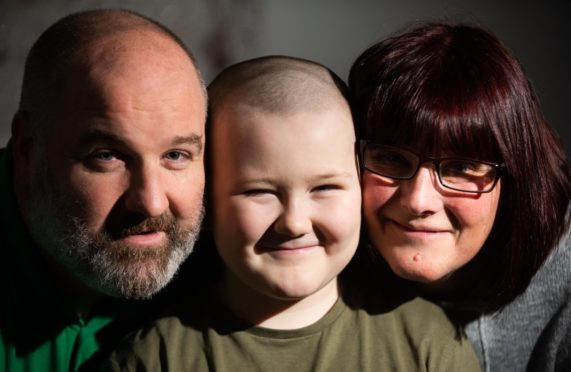A mum has revealed her young son was sent home from the doctor with Gaviscon after repeatedly complaining of chest pains – only for tests to later reveal it was an aggressive blood cancer.
Young footballer Jimmy Griffin, from Mintlaw, was told it was indigestion when he first visited the doctor.
But unsatisfied, and aware her son was losing weight, tired and not himself, mum Nicola Turnbull kept pushing.
After his fourth appointment, the nine-year-old was given a blood test that confirmed he had acute lymphoblastic leukaemia.
Just hours later, the youngster – who plays for Mintlaw Boys Club in the Aberdeen and District junior league – was rushed to hospital to begin a gruelling three-year treatment regime.
Miss Turnbull, who was also told it could be an infection in his stomach that was stopping the Gaviscon from working, said: “When she said leukaemia, I just felt like someone had punched me in the face.
“I knew there was something wrong but I didn’t think it would be this.”
By the time Jimmy was diagnosed in October he was so lethargic he was “shattered” after just 10 minutes on the pitch and the pain would often leave him crying in agony.
Now, as well as regular trips to hospital for chemotherapy, blood transfusions and lumbar punctures, Jimmy has to swallow more than 100 tablets every week in his fight against the disease.
His immune system is so weak he has to miss out on going to school for fear dust from near-by building work could leaving him clinging to life in hospital.
But dad Stuart, who was at sea when he learned his son had cancer, said Jimmy “takes everything in his stride”.
He and his partner, who are also parents to seven-year-old Eireann, are now sharing their son’s story to raise awareness of the illness, which affects 790 people each year in the UK and is the most common type of leukaemia in children.
Mr Griffin said: “Parents and doctors need to be vigilant. As far as his consultants are concerned, it was caught early. But it took four appointments over five weeks before he was given a blood test.
“At his first appointment they asked him if it was a ‘burny’ pain and he had just said ‘yes’, and the doctor said it was acid reflux. But how is a nine-year-old supposed to know what kind of pain they have?”
After he was finally diagnosed in October, Jimmy was taken to the Royal Aberdeen Children’s Hospital where he underwent a bone marrow procedure and lumbar puncture.
Tests have shown that after four months of chemotherapy that there is “not one” leukaemia cell left, but he must continue the 36-month treatment to ensure the disease does not return.
An NHS Grampian spokesman said: “We cannot comment on individual patient cases, but would strongly encourage patients, their families or guardians to contact us regarding any concerns they have.”
Remarkably, Jimmy managed to return to school a few weeks ago.
But since building work has started nearby, he has to stay at home.
The keen footballer has also had to temporarily stop playing contact sports.
But he is hoping to get back on the pitch when his chemotherapy is reduced to once a month, which is expected to be later this year.
In the meantime, his team has got behind him and helped raise more than £12,000 to support him and his family.
And to keep his spirits up, a kind member of the public with links to the Aberdeen and District Juvenile Football Association organised for him to watch Celtic from the directors box at Celtic Park last month. He also got to meet some of the players, including captain Scott Brown.
Mr Griffin said: “He loves his football and he can’t wait to get back playing. He was very active before all of this.
“But he’s a trooper. He’s just rolled with the punches and took everything as it came.”
Mr Griffin, who has taken time off work to help care for Jimmy, said the club initially planned to raise a few hundred pounds to buy Jimmy a games console while he was in hospital. But within weeks they collected thousands of pounds to assist the family.
“Everyone has been so supportive,” he said. “Jimmy’s very popular and a lot of fun.”
